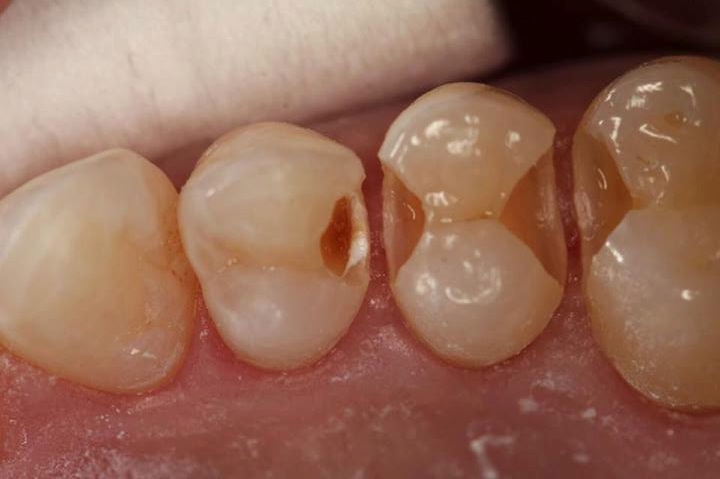
LiveScience asks the experts to answer questions about your health. This week, we asked dentists and experts on dental hygiene: why should people floss? Their answers have been edited.
Caren Barnes, a professor of dental hygiene at the University of Nebraska Medical Center:
When we eat carbohydrates, the microorganisms in dental plaque convert the carbohydrates to an acid that attacks the enamel of the teeth. The acid decalcifies the enamel, and thus a dental carious lesion, or cavity, begins to form.
The microorganisms in dental plaque cause inflammation of the soft tissues, specifically the gingiva (gums). If not stopped, this inflammation causes gingivitis, which can be reversed with good oral hygiene. If it is not reversed, gingivitis can destroy the deeper supporting soft tissue structures and eventually the bone that holds the tooth in the socket.
When that occurs, periodontal disease has been established. It can be stopped with scrupulous oral hygiene, but sometimes surgical intervention is necessary. However, the bone will not grow back.
The purpose of using dental floss is to remove dental plaque and biofilm from the surfaces of the teeth, especially the surface between two teeth. Because the spaces between teeth are usually so small, toothbrush bristles cannot reach in between the two tooth surfaces.
Dr. Walter Bretz, professor of cariology and comprehensive care at the New York University College of Dentistry:
Sign up for the Live Science daily newsletter now
Get the world’s most fascinating discoveries delivered straight to your inbox.
Because there is good evidence of the link between periodontal diseases and systemic diseases (cardio-vascular diseases, diabetes, obesity, pneumonia, etc.), the message in a very figurative way is "floss or die."
The suggested flossing regimen is in the morning after a meal, and at night before bedtime. No one has really studied daily versus weekly removal of plaque by flossing, but since plaque formation is a continuous process, daily removal is recommended for optimal health.
Dr. Peter Lockhart, Professor and Chair Emeritus of the Department of Oral Medicine at the Carolinas Medical Center in Charlotte, N.C.
There's no question that if you take 100 people off the street, and they all have the same diet and everything else the same, but one group flosses and one doesn't, you would find more inflammation and gum problems and perhaps bone loss in the group that did not floss.
If you want to keep 'em, you've got to keep 'em clean.
A lot of people think the important thing is to move the floss through the contact point between the two teeth, but in fact, floss can be somewhat destructive if you're not careful. It's very thin, and you can cut the delicate tissues with it.
You should saw the floss through the contact point — not snap it through, because on the other side it will lacerate the gum tissue and it will hurt. Gently bring the floss toward the base of the tooth, and then pull it tight against the tooth, and bring it away from the tooth's base.
So you're pulling away from the gum, and you're getting the floss down at the base of the pocket. That’s what scrapes the plaque off.
Dr. Tim Pruett, a dentist in Tavares, Fla., and the inventor of the Flossolution, a sonic energy-powered flossing system:
One of the newer things we found is that a lot of the gum tissue response with gingivitis and periodontal disease is dependent on the person: the way your immune system responds, your inflammatory reaction, how you respond to the presence of the biofilm.
People don't respond equally to flossing, but we do know that removing the debris minimizes the chances of an inflammatory reaction.
There are certain groups of people that are more vulnerable to tooth decay and gum disease. Saliva is one of the most protective fluids in our mouth. So folks that go through chemotherapy, cancer therapy or are on medications that limit the quality and quantity of the saliva in their mouth, those are definitely folks that want to pay attention to their oral hygiene regimen.
What we see a lot with pregnant women is a lot of acid regurgitation, and that's a definite contributory factor to tooth decay. It also lowers the pH of your mouth, which creates an environment where the types of bacteria that cause decay can thrive.
At nighttime is your biggest issue. Your mouth is closed most the time, you've created an anaerobic environment. You are not chewing, or eating or talking -- facial movements are how saliva gets moved around within the mouth. That's why brushing and flossing at night is absolutely the most important time to do it.
Gaby Judah, hygiene researcher at the London School of Hygiene and Tropical Medicine:
Evidence suggests that flossing after you brush your teeth is more likely to help you form a habit, than flossing before brushing. Try to remind yourself to floss by leaving it somewhere visible such as next to the toothpaste, and even making a visible note or reminder for you to floss. You should also try to commit to yourself that you will floss every evening after brushing your teeth, to help you to start doing it regularly, and hopefully form a habit.
Follow Tia Ghose on Twitter and Google+. Follow LiveScience @livescience, Facebook & Google+. Original article on LiveScience.

Tia is the managing editor and was previously a senior writer for Live Science. Her work has appeared in Scientific American, Wired.com and other outlets. She holds a master's degree in bioengineering from the University of Washington, a graduate certificate in science writing from UC Santa Cruz and a bachelor's degree in mechanical engineering from the University of Texas at Austin. Tia was part of a team at the Milwaukee Journal Sentinel that published the Empty Cradles series on preterm births, which won multiple awards, including the 2012 Casey Medal for Meritorious Journalism.










